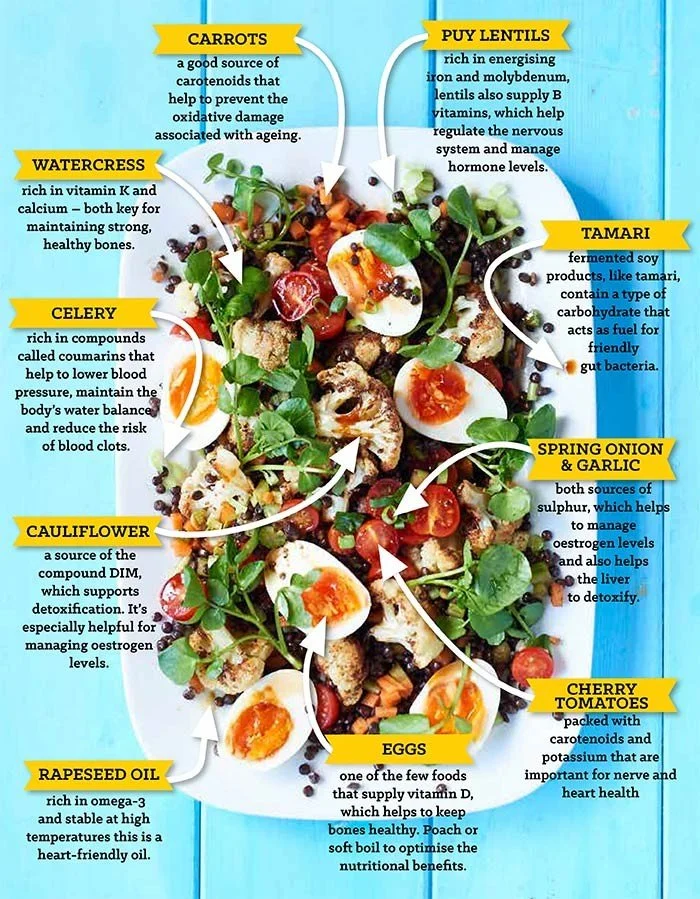Menopause Nutrition: Foods to Eat & Avoid
Menopause brings a host of changes—some expected, others less so. From hot flashes and mood swings to unexpected weight gain, your body is adjusting to a significant hormonal shift. Fortunately, the foods you choose can help manage these symptoms naturally.
This article outlines the best foods to eat and avoid during menopause. You’ll also find a sample one-day meal plan and practical tips to help you feel balanced, supported, and in control of your health.
What Happens to Your Body During Menopause?
During menopause, your body undergoes several hormonal and metabolic changes that impact how you feel day to day.
Key Hormonal Shifts
Estrogen and progesterone levels decline
Metabolism slows and muscle mass may decrease
Insulin sensitivity reduces, impacting blood sugar regulation
Bone density tends to decrease, raising risk of fractures
Symptoms Influenced by Diet
Hot flashes and night sweats
Sleep disturbances
Fatigue and brain fog
Mood changes and irritability
Abdominal weight gain
Joint pain and inflammation
A diet tailored to support these hormonal shifts can help ease symptoms and improve overall well-being.
Best Foods to Eat During Menopause
Choosing the right foods can help regulate hormones, reduce inflammation, and stabilize mood and weight. These are the top categories to focus on.
Phytoestrogen-Rich Foods
Phytoestrogens are plant compounds that mimic estrogen in the body and may help balance hormone fluctuations.
Ground flaxseeds
Tofu, tempeh, and edamame
Chickpeas and lentils
Sesame seeds
Try adding ground flax to smoothies, oats, or salads. For quality flaxseeds and a grinder, check out this product.
Anti-Inflammatory Foods
Inflammation contributes to joint pain, fatigue, and hot flashes. Anti-inflammatory foods include:
Fatty fish such as salmon and sardines
Berries (blueberries, raspberries, strawberries)
Leafy greens like spinach and kale
Olive oil
Ginger and turmeric
These foods are also central to the Mediterranean diet for menopause, which emphasizes anti-inflammatory benefits.
High-Fiber Foods
Fiber supports gut health, stabilizes blood sugar, and helps reduce cholesterol.
Chia seeds, oats, and quinoa
Avocados
Black beans, lentils, and split peas
Whole fruits with skin
Aim for 25 to 30 grams of fiber daily.
Calcium and Vitamin D Sources
Bone density naturally declines with age and low estrogen levels. Focus on:
Fortified almond or soy milk
Sardines with bones
Broccoli, bok choy, and kale
Eggs and mushrooms (for vitamin D)
Many women also benefit from a calcium + vitamin D3 supplement such as this option.
Protein-Rich Foods
Protein is essential for maintaining muscle mass and metabolism.
Eggs, poultry, and Greek yogurt
Legumes and tofu
Protein powders (plant-based or whey)
Including protein in every meal also supports satiety and weight management.
For customized support, book a session with a registered dietitian.
Foods to Avoid That May Worsen Menopause Symptoms
Some foods can intensify hot flashes, worsen sleep, and increase inflammation.
Caffeine and Alcohol
Caffeine can disrupt sleep and trigger hot flashes
Alcohol may elevate body temperature and worsen night sweats
Switch to caffeine-free herbal teas in the afternoon and try mocktails made with sparkling water and herbs.
Refined Sugars and Processed Carbs
White bread, pastries, sugary cereals, soda
These spike blood sugar and may worsen mood swings
Replace with whole grains like brown rice, oats, or quinoa.
High-Sodium and Processed Foods
Frozen meals, deli meats, chips, and canned soups
These may increase bloating and raise blood pressure
Use fresh herbs, lemon juice, and vinegar to flavor food instead of salt.
Sample 1-Day Menopause-Friendly Meal Plan
This plan supports hormone balance, reduces inflammation, and keeps blood sugar stable.
Breakfast
Overnight oats with ground flaxseeds, blueberries, and unsweetened almond milk
Optional: Add a scoop of plant-based protein powder
Lunch
Grilled salmon on a kale and quinoa salad with walnuts, olive oil, and pomegranate seeds
Snack
Chia pudding made with soy milk, cinnamon, and sliced pear
Dinner
Tofu stir-fry with broccoli, red bell peppers, and brown rice
Side of steamed greens with lemon and olive oil
This type of plan aligns with a plant-based diet for menopause and supports consistent energy throughout the day.
FAQs About Menopause and Nutrition
Can diet help reduce menopause symptoms?
Yes. According to the North American Menopause Society, nutrition plays a key role in managing symptoms such as hot flashes, bone health, and weight gain.
What’s the best diet to prevent weight gain during menopause?
A Mediterranean-style diet works well. It includes vegetables, healthy fats, legumes, whole grains, and lean proteins. It’s anti-inflammatory and supports blood sugar stability.
Are soy and phytoestrogens safe?
Moderate intake of whole soy foods like tofu, tempeh, and edamame is considered safe and even beneficial for many women.
Is dairy helpful or harmful?
Some women benefit from dairy as a calcium source, while others may experience bloating. Listen to your body or choose lactose-free or fortified plant-based alternatives.
Final Tips for Navigating Menopause with Nutrition
Build your meals around protein, fiber, and healthy fats
Stay hydrated and avoid skipping meals
Reduce intake of alcohol, caffeine, and processed foods
Consider adding fermented foods for gut support
Be consistent and give yourself time to adjust
Small, sustainable changes lead to long-term results.
Get Support for Your Menopause Journey
Menopause is a natural transition—but it doesn’t have to be overwhelming. Nutrition is one of the most effective tools you have to feel better, sleep better, and manage weight and mood.
For tailored meal plans, supplement recommendations, and ongoing support, work with a registered dietitian today.
Looking for trusted tools and supplements? Visit our Amazon menopause essentials page for product picks that support your hormones and lifestyle.

